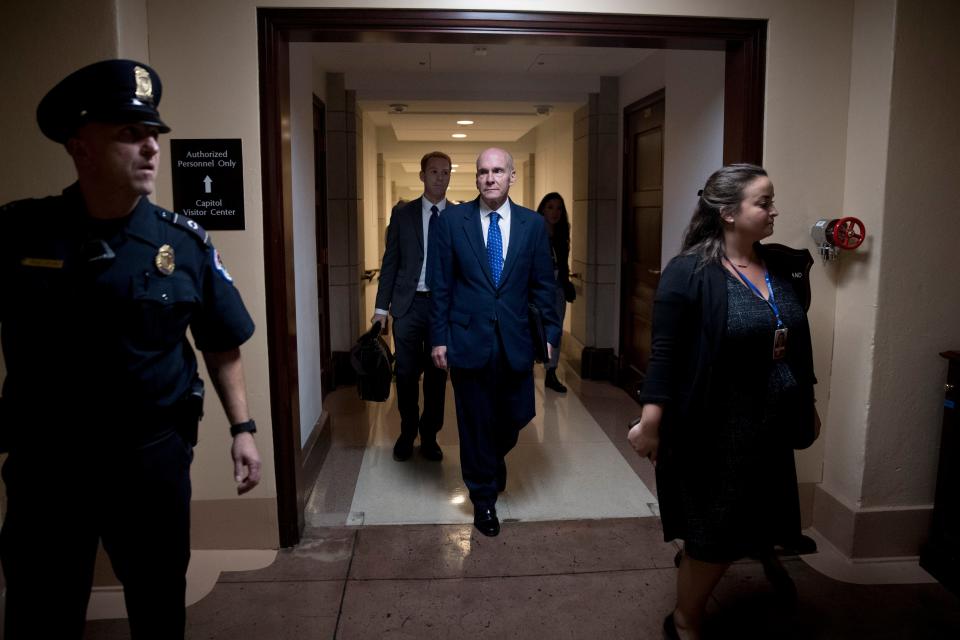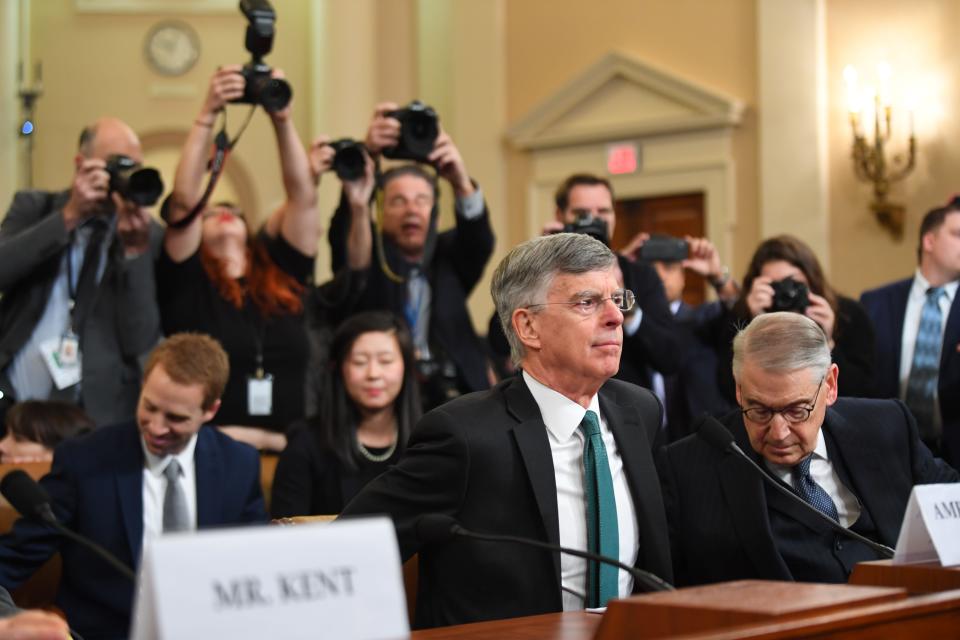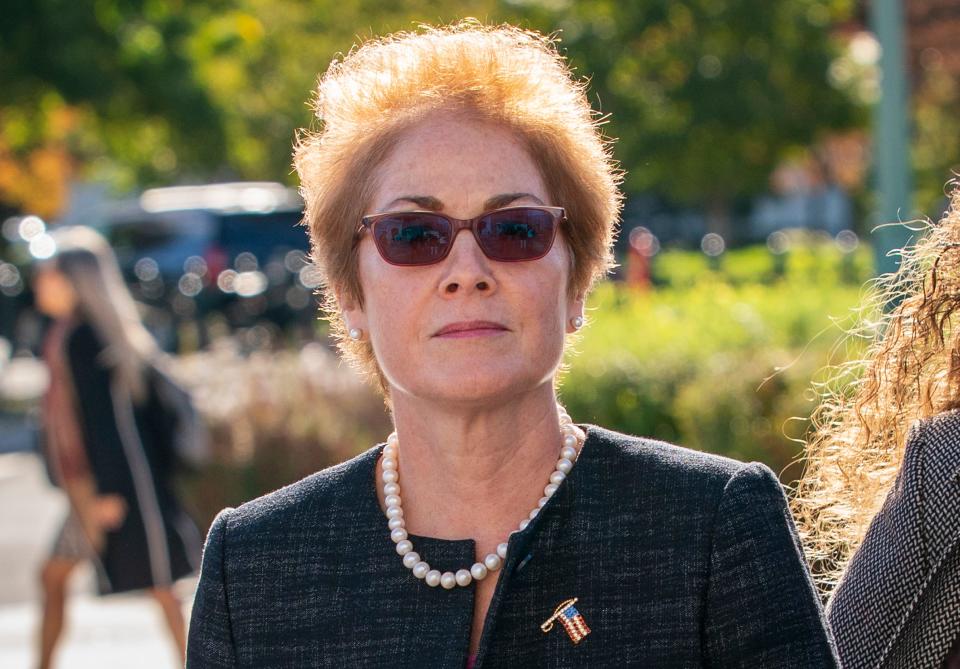Mike Pompeo 'on shifting sand' as impeachment probe reveals his Ukraine role
WASHINGTON – It was Sept. 22 when Secretary of State Mike Pompeo fielded a straightforward question about just-emerging reports that President Donald Trump had sought to pressure Ukraine's president to open two investigations motivated by domestic politics: “What do you know about those conversations?”
Pompeo offered an evasive answer, giving the impression that he was unfamiliar with the details of Trump's July 25 call with Ukraine's president, Volodymyr Zelensky. That phone call triggered a whistleblower complaint alleging that Trump had solicited foreign interference in the 2020 election.
"So you just gave me a report about a, I see, whistleblower complaint, none, none of which I've seen," Pompeo told ABC News on that Sunday morning.
It has now become clear that Pompeo was, in fact, intimately familiar with the campaign by Trump and his personal lawyer, Rudy Giuliani, to get Zelensky to say publicly that Ukraine would investigate former Vice President Joe Biden and would also probe a debunked conspiracy theory that Ukraine, not Russia, interfered in the 2016 presidential election.
Critics say that Pompeo's credibility has collapsed amid revelations that the State Department chief enabled Giuliani to run a shadow foreign policy operation that undermined Ukraine, a vital U.S. ally under attack from Russia. The scandal has left America's top diplomat weakened in Washington and on the world stage, former diplomats say.

Testimony takeaways: How Democrats and Republicans are laying out their arguments for impeachment
“So far, the choices that the secretary of State appears to have made have alienated him from his team, diminishing his ability to carry out our foreign policy,” said Lee Feinstein, a former U.S. ambassador to Poland and longtime State Department official. Every secretary of State faces a delicate balancing act of trying to keep the president’s confidence while giving him blunt advice and navigating complex geopolitical relationships, Feinstein and others say.
But Pompeo is "on shifting sand" as he tries to defend Trump's actions amid a revolt from career State Department diplomats, said Cameron Hume, a 40-year veteran of the foreign service and former ambassador to Algeria, South Africa and Indonesia, among other posts.
The State Department did not respond to detailed questions for this story. James Jay Carafano, a foreign policy expert at the conservative Heritage Foundation, dismissed the House Democrats' impeachment inquiry as partisan and said Pompeo handled the situation appropriately.
"There’s no evidence that he did anything wrong," Carafano said.
Pompeo has shrugged off questions about his own actions and dismissed the inquiry as "Washington noise."
But that "noise" has pulled back the curtain on what Pompeo knew about the Ukraine pressure campaign and how he responded. Here's what the testimony so far has shown:
First-person cable from Ukraine: 'I am concerned'
On Aug. 29, about a month before the Ukraine allegations burst into public view, Pompeo received an urgent cable from his top U.S. diplomat in Ukraine, Bill Taylor, raising alarm bells about the Trump-Giuliani pressure campaign. In that classified missive, Taylor said he was specifically concerned that the Trump administration was withholding vital U.S. military aid, which Ukraine needed to counter Russian attacks, as leverage to force Zelensky to accede to Trump and Giuliani's demands.
"I told the secretary that I could not and would not defend such a policy," Taylor told lawmakers on Wednesday, during the House Democrats' first public impeachment hearing.
Taylor said he sent that Aug. 29 cable on the advice of John Bolton, then Trump's national security adviser, who also told him to write it in the first person, because that would be sure to catch Pompeo's attention. Most such missives are written in the third person.
"There are not many first-person cables coming, so it gets attention when it comes in from the ambassador saying: 'I am concerned'," Taylor recounted during his closed-door testimony in the impeachment inquiry.

Taylor told lawmakers that he never received a response from Pompeo to that message, though he heard the secretary of State took it with him to a White House meeting focused on the Ukraine security.
Pompeo has refused to answer questions about what he did with the cable. "I’m not going to talk about the inquiry this morning," Pompeo told the Wichita Eagle on Oct. 24, when he was in Kansas for an event with Ivanka Trump, the president's daughter and a White House adviser.
The reporter pressed: "So did you relay (Taylor's) concerns to the president?"
"Look, I came here today to talk about workforce development," Pompeo responded.
Sondland: 'All my actions involving Ukraine had the blessing of Secretary Pompeo'
Gordon Sondland, the ambassador to the European Union, was a central player in carrying out Trump and Giuliani's efforts to pressure Ukraine – communicating their demands to Ukrainian officials and other U.S. diplomats.
"I understand that all of my actions involving Ukraine had the blessing of Secretary Pompeo," he told lawmakers last month, according to a transcript of his testimony. When he raised Giuliani's involvement in the Ukraine matter, "Pompeo rolled his eyes and said: 'Yes, it’s something we have to deal with,'" Sondland recalled.
Pompeo's response seems to stand in stark contrast with that of Bolton, who warned his deputies to steer clear of Giuliani and called him a "hand grenade that is going to blow everybody up,” according to testimony from Fiona Hill, who served under Bolton as the National Security Council's senior director for Europe and Russia.
“Ambassador Bolton had said repeatedly that nobody should be meeting with Giuliani,” Hill told lawmakers during her testimony. She said after one meeting with Sondland, Bolton told her to report the conversation to the NSC's lawyer, John Eisenberg.
“You go and tell Eisenberg that I am not part of whatever drug deal Sondland and (Trump's chief of staff Mick) Mulvaney are cooking up on this," Hill recounted. Sondland was working with Mulvaney, who ordered the freeze on aid to Ukraine.
The White House eventually lifted the freeze amid a bipartisan backlash in Congress. But Sondland told lawmakers that there was essentially a quid pro quo when it came to Trump's Ukraine policy, although he did not use that term.
Sondland told lawmakers that a White House visit for Zelensky – something the Ukrainian leader desperately wanted as a public demonstration of U.S. support – would be granted only after Zelensky publicly committed to the investigations Trump and Giuliani wanted. Sondland said he "presumed" that U.S. military assistance was linked to a public Zelensky statement because there was no other credible explanation.
Both Hill and Sondland said the Trump administration's actions, in particular delaying the military aid, undermined Ukraine as it was trying to project strength in its war with Russian-backed separatists. That, in turn, undermined U.S. national security.
"This is actually my worst nightmare," Hill said. "My worst nightmare is the politicization of the relationship between the U.S. and Ukraine and, also, the usurpation of authorities, you know, for other people’s personal vested interests."
In her words: Read the transcript of Fiona Hill's impeachment testimony
Pompeo has repeatedly argued that Trump's policy toward Ukraine strengthened the country and that the administration was focused on helping Ukraine root out rampant corruption.
"We have robustly helped the Ukrainian people, and we collectively at the State Department have been focused like a laser on" helping Ukraine become a pro-Western democracy, he said in an interview Nov. 4 with a Kansas City talk radio show.
Pompeo and others have emphasized that under Trump, the U.S. began providing lethal weapons to Ukraine, a more aggressive form of support than the Obama administration had provided.
"They chose to provide blankets," Pompeo said in another recent interview, referring to the Obama administration's Ukraine policy. "We gave them real weapons, where they could fight against the Russians. I am proud of what the administration did with its Ukraine policy."
Ukraine Ambassador: Pompeo 'tried to protect me but was no longer able to'
Pompeo helped carry out one of Giuliani's key demands: the removal of Marie Yovanovitch, the former U.S. ambassador to Ukraine. Giuliani alleged she was insufficiently loyal to the president, and he targeted her with "a campaign of lies," according to George Kent, the State Department's deputy assistant secretary for European and Eurasian affairs.
After being asked to extend her tenure until 2020, Yovanovitch got phone call in late April of this year: "I was then abruptly asked to come back to Washington from Ukraine on the next plane," she told lawmakers.
She asked for an explanation, during that initial phone call and again when she got home. She was told that she had not done anything wrong and that Pompeo had "tried to protect me but was no longer able to do that."

Kent and other top State Department officials felt Yovanovitch had been mistreated, and they pressed Pompeo to release a public statement of support for Yovanovitch. P. Michael McKinley, who was a senior adviser to Pompeo until he resigned last month, said he asked Pompeo about issuing such a statement three times, but Pompeo did not respond.
"It shouldn’t be difficult to put out a short statement that’s not political, stating clearly that we respect the professionalism, the tenure of Ambassador Yovanovitch in the Ukraine,” McKinley told lawmakers in describing his request to Pompeo.
Pompeo has not said why he didn’t come to the ambassador’s defense.
McKinley said he resigned over Pompeo's refusal to defend career diplomats and a belief that Trump was using the State Department to dig up dirt on a political opponent. McKinley said it was a shocking first in his long career as a diplomat.
“If I can underscore, in 37 years in the Foreign Service and different parts of the globe and working on many controversial issues, working 10 years back in Washington, I had never seen that,” McKinley told lawmakers, according to the transcript of his testimony.
Read them here: All transcripts from closed-door testimony in the impeachment inquiry
This article originally appeared on USA TODAY: Impeachment hearings: Mike Pompeo on 'shifting sand' in Ukraine probe

